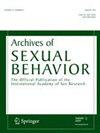Machine Learning Identifies Sexual Behavior Subgroups Among Men Who Have Sex with Men in Switzerland.
IF 2.9
2区 社会学
Q1 PSYCHOLOGY, CLINICAL
引用次数: 0
Abstract
Sexual behavior is heterogeneous and dynamic. Characterization of such complexity constitutes evidence for public health authorities and caregivers concerned with the framing of sexual health messages aimed at specific subgroups. We developed a machine-learning-based methodology for inference and characterization of such subgroups from longitudinal data on men who have sex with men (MSM) attending individual sexual health counseling sessions. Because longitudinal data take time to record, we assessed the ability of first visit data to predict subgroups' membership. Our methodology comprised two main steps: (1) Hierarchical clustering to group 2349 HIV-negative MSM based on their self-reported longitudinal sexual behavior during visits to Swiss sexual health counseling centers between November 2016 and April 2019; and (2) Random forest-based classification to predict subgroup membership from first visit data. We found six subgroups with significant differences in behavioral trends, most of which sharply deviated from the overall trends. Two subgroups, which contained 37% of the study population, accounted for over 70% of the overall increases in condomless anal intercourse with non-steady partners, group sex, and having more than five anal intercourse partners. Subgroup-specific trends in online-dating and group sex were heterogeneous with opposing trends across subgroups. Data from first visits predicted trends of sexual behavior with accuracy ranging from 64 to 86%. This study evidenced specific sexual behavioral subgroups that might benefit from customized sexual health messages, demonstrated that first visit registries could predict subgroups, and contributes an algorithmic alternative for establishing subgroups relevant to inform customized sexual health messages that capture sexual behavioral diversity.机器学习识别瑞士男男性行为中的性行为亚组。
性行为是异质的和动态的。这种复杂性的特征为公共卫生当局和关注针对特定亚群体的性健康信息框架的护理人员提供了证据。我们开发了一种基于机器学习的方法,从参加个人性健康咨询会议的男男性行为者(MSM)的纵向数据中推断和表征这些亚组。由于纵向数据需要时间来记录,我们评估了首次访问数据预测子群体成员的能力。我们的方法包括两个主要步骤:(1)基于2016年11月至2019年4月期间访问瑞士性健康咨询中心期间自述的纵向性行为对2349组hiv阴性MSM进行分层聚类;(2)基于随机森林的分类,从首次访问数据中预测子群体的隶属度。我们发现六个亚组在行为趋势上存在显著差异,其中大多数与总体趋势大相径庭。两个亚组占研究人口的37%,占与非稳定伴侣、群体性行为和有超过5个肛交伴侣进行无套肛交的总体增长的70%以上。在线约会和群体性行为的亚组特定趋势是异质的,不同亚组之间的趋势相反。第一次访问的数据预测性行为趋势的准确率在64%到86%之间。本研究证明了特定的性行为亚组可能受益于定制的性健康信息,证明了首次访问登记可以预测子组,并提供了一种算法替代,用于建立相关的子组,以告知捕获性行为多样性的定制性健康信息。
本文章由计算机程序翻译,如有差异,请以英文原文为准。
求助全文
约1分钟内获得全文
求助全文
来源期刊

Archives of Sexual Behavior
Multiple-
CiteScore
5.60
自引率
13.20%
发文量
299
期刊介绍:
The official publication of the International Academy of Sex Research, the journal is dedicated to the dissemination of information in the field of sexual science, broadly defined. Contributions consist of empirical research (both quantitative and qualitative), theoretical reviews and essays, clinical case reports, letters to the editor, and book reviews.
 求助内容:
求助内容: 应助结果提醒方式:
应助结果提醒方式:


